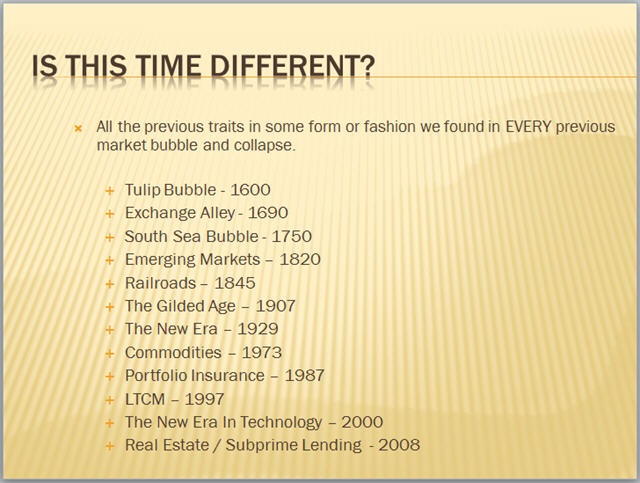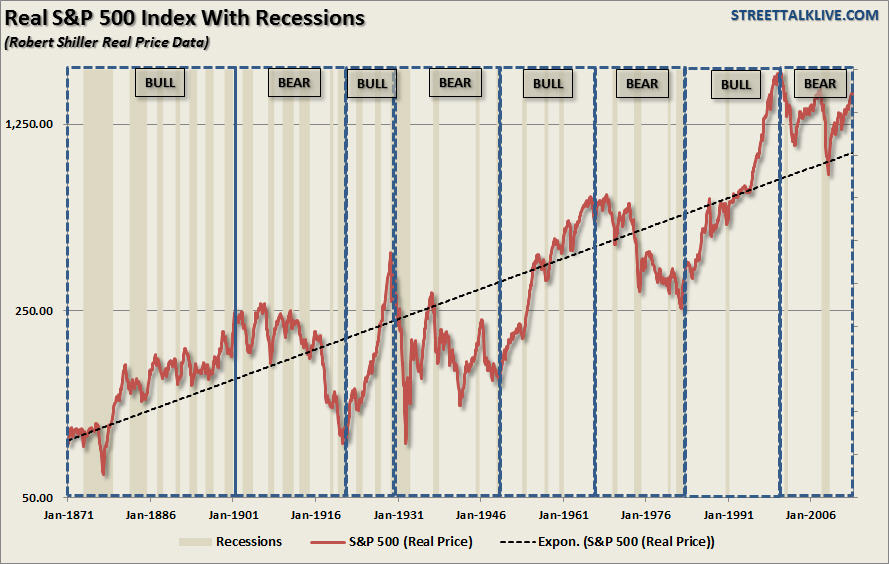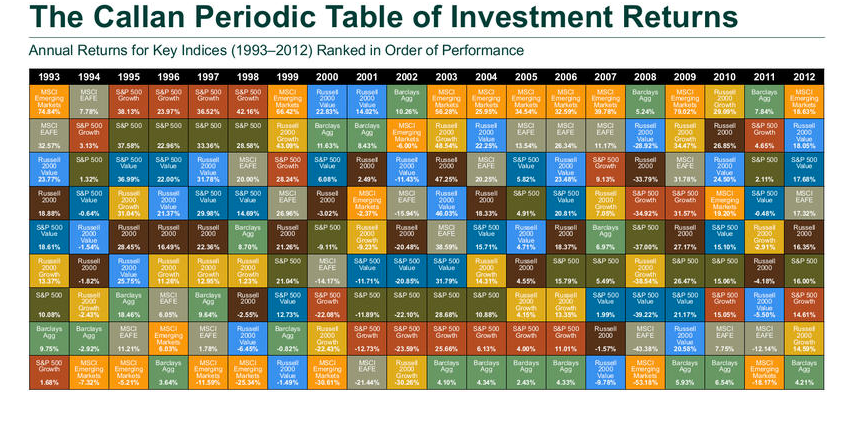I was recently interviewed by Fox Business for my thoughts on what "first time" investors should be doing right now. As the markets are propelled higher by the successive interventions of the Federal Reserve it is hard not to think that the current rise will continue indefinitely. The most common belief is currently that even if the Fed begins to "taper" their purchases the resurgence of economic growth will continue to propel stocks higher even in the face of higher interest rates. The financial world has finally achieved a "utopian" state where there is no longer investment risk in any asset class - because if it stumbles the central banks of the world will be there to catch them.
However, a quick look at history tells us that this time is not really different. In March of 2008 I was giving a seminar discussing why we had already likely entered into a recession and that a market swoon of mass proportions was approaching. While the advice fell on deaf ears as we were in a "Goldilocks" economy, and "subprime" was contained, the bubble ended just a few short months later as it was no "different" then versus any other time in history, or, even now. The slide below was from the presentation:
Of course, the next time I make this presentation I will have to add "Central Bank Interventions" to the list.
The reality is that markets cycle from peaks to troughs as excesses built up during the up cycle are liquidated. The chart below shows the secular cycles of the market going back to 1871 adjusted for inflation.
This time is not different. The excesses being built up in the markets today will eventually be reverted just as they have been at every other peak in market history.
There are 10 basic investment rules that have historically kept investors out of trouble over the long term. These are not unique by any means but rather a list of investment rules that in some shape, or form, has been uttered by every great investor in history.
1) You are a speculator - not an investor
Unlike Warren Buffet who takes control of a company and can affect its financial direction - you can only speculate on the future price someone is willing to pay you for the pieces of paper you own today. Like any professional gambler - the secret to long term success was best sung by Kenny Rogers; "You gotta know when to hold'em...know when to fold'em".
2) Asset allocation is the key to winning the "long game"
In today's highly correlated world there is little diversification between equity classes. Therefore, including other asset classes, like fixed income which provides a return of capital function with an income stream, can reduce portfolio volatility. Lower volatility portfolios outperforms over the long term by reducing the emotional mistakes caused by large portfolio swings.
3) You can't "buy low" if you don't "sell high"
Most investors do fairly well at "buying" but stink at "selling." The reason is purely emotional driven primarily by "greed" and "fear." Like pruning and weeding a garden; a solid discipline of regularly taking profits, selling laggards and rebalancing the allocation leads to a healthier portfolio over time.
4) No investment discipline works all the time - however, sticking to discipline works always.
Growth, value, international, small cap or bonds all have had times when they topped the charts in terms of return. However, like everything in life, investment styles cycle. There are times when growth outperforms value, or international is the place to be, but then it changes. The problem is that by the time investors realize what is working they are late rotating into it. This is why the truly great investors stick to their discipline in good times and bad. Over the long term - sticking to what you know, and understand, will perform better than continually jumping from the "frying pan into the fire."
5) Losing capital is destructive. Missing an opportunity is not.
As any good poker player knows - once you run out of chips you are out of the game. This is why knowing both "when" and "how much" to bet is critical to winning the game. The problem for most investors is that they are consistently betting "all in all of the time." as they are afraid of "missing out." The reality is that opportunities to invest in the market come along as often as taxi cabs in New York city. However, trying to make up lost capital by not paying attention to the risk is a much more difficult thing to do.
6) You most valuable, and irreplaceable commodity, is "time."
Since the turn of the century investors have recovered, theoretically, from two massive bear market corrections. After 13 years investors are now back to where they were in 2000 if we don't adjust for inflation. The problem is that the one commodity that has been lost, and can never be recovered, is "time." For investors getting back to even is not an investment strategy. We are all "savers" that have a limited amount of time within which to save money for our retirement. If we were 15 years from retirement in 2000 - we are now staring it in the face with no more to show for it than what we had over a decade ago. Do not discount the value of "time" in your investment strategy.
7) Don't mistake a "cyclical trend" as an "infinite direction" .
There is an old Wall Street axiom that says the "trend is your friend." Investors always tend to extrapolate the current trend into infinity. In 2007 the markets were expected to continue to grow as investors piled into the market top. In late 2008 individuals were convinced that the market was going to zero. Extremes are never the case. It is important to remember that the "trend is your friend" as long as you are paying attention to, and respecting, its direction. Get on the wrong side of the trend and it can become your worst enemy.
8) If you think you have it figured out - sell everything. Individuals go to college to become doctors, lawyers and even circus clowns. Yet, every day, individuals pile into one of the most complicated games on the planet with their hard earned savings with little, or no, education at all. For most individuals, when the markets are rising, their success breeds confidence. The longer the market rises; the more individuals attribute their success to their own skill. The reality is that a rising market covers up the multitude of investment mistakes that individuals make by taking on excessive risk, poor asset selection or weak management skills. These errors are revealed by the forthcoming correction.
9) Being a contrarian is tough, lonely and generally right. Howard Marks once wrote that:
The best investments are generally made when going against the herd. Selling to the "greedy" and buying from the "fearful" are extremely difficult things to do without a very strong investment discipline, management protocol and intestinal fortitude. For most investors the reality is that they are inundated by "media chatter", which keeps them from making logical and intelligent investment decisions regarding their money which, unfortunately, leads to bad outcomes.
10) Benchmarking performance only benefits Wall Street
The best thing you can do for your portfolio is to quite benchmarking it against a random market index that has absolutely nothing to do with your goals, risk tolerance or time horizon. Tom Dorsey summed this up well by stating that:
The only benchmark that matters to you is the annual return that is specifically required to obtain your retirement goal in the future. If that rate is 4% then trying to obtain 6% more than doubles the risk you have to take to achieve that return. The end result is that by taking on more risk than is necessary will put your further away from your goal than you intended when something inevitably goes wrong.
It's all in the risk
Robert Rubin, former Secretary of the Treasury, changed the way I thought about risk when he wrote:
It should be obvious that an honest assessment of uncertainty leads to better decisions, but the benefits of Rubin's approach go beyond that. For starters, although it may seem contradictory, embracing uncertainty reduces risk while denial increases it. Another benefit of "acknowledged uncertainty" is it keeps you honest. A healthy respect for uncertainty, and a focus on probability, drives you never to be satisfied with your conclusions. It keeps you moving forward to seek out more information, to question conventional thinking and to continually refine your judgments and understanding that difference between certainty and likelihood can make all the difference.
The reality is that we can't control outcomes; the most we can do is influence the probability of certain outcomes which is why the day to day management of risks and investing based on probabilities, rather than possibilities, is important not only to capital preservation but to investment success over time.
Originally posted at Lance's blog, streettalklive
- English (UK)
- English (India)
- English (Canada)
- English (Australia)
- English (South Africa)
- English (Philippines)
- English (Nigeria)
- Deutsch
- Español (España)
- Español (México)
- Français
- Italiano
- Nederlands
- Português (Portugal)
- Polski
- Português (Brasil)
- Русский
- Türkçe
- العربية
- Ελληνικά
- Svenska
- Suomi
- עברית
- 日本語
- 한국어
- 简体中文
- 繁體中文
- Bahasa Indonesia
- Bahasa Melayu
- ไทย
- Tiếng Việt
- हिंदी
10 Investment Rules To Live By
Published 08/09/2013, 03:00 PM
Updated 02/15/2024, 03:10 AM
10 Investment Rules To Live By
3rd party Ad. Not an offer or recommendation by Investing.com. See disclosure here or
remove ads
.
Latest comments
when interest rates go up the economy will drop
Install Our App
Risk Disclosure: Trading in financial instruments and/or cryptocurrencies involves high risks including the risk of losing some, or all, of your investment amount, and may not be suitable for all investors. Prices of cryptocurrencies are extremely volatile and may be affected by external factors such as financial, regulatory or political events. Trading on margin increases the financial risks.
Before deciding to trade in financial instrument or cryptocurrencies you should be fully informed of the risks and costs associated with trading the financial markets, carefully consider your investment objectives, level of experience, and risk appetite, and seek professional advice where needed.
Fusion Media would like to remind you that the data contained in this website is not necessarily real-time nor accurate. The data and prices on the website are not necessarily provided by any market or exchange, but may be provided by market makers, and so prices may not be accurate and may differ from the actual price at any given market, meaning prices are indicative and not appropriate for trading purposes. Fusion Media and any provider of the data contained in this website will not accept liability for any loss or damage as a result of your trading, or your reliance on the information contained within this website.
It is prohibited to use, store, reproduce, display, modify, transmit or distribute the data contained in this website without the explicit prior written permission of Fusion Media and/or the data provider. All intellectual property rights are reserved by the providers and/or the exchange providing the data contained in this website.
Fusion Media may be compensated by the advertisers that appear on the website, based on your interaction with the advertisements or advertisers.
Before deciding to trade in financial instrument or cryptocurrencies you should be fully informed of the risks and costs associated with trading the financial markets, carefully consider your investment objectives, level of experience, and risk appetite, and seek professional advice where needed.
Fusion Media would like to remind you that the data contained in this website is not necessarily real-time nor accurate. The data and prices on the website are not necessarily provided by any market or exchange, but may be provided by market makers, and so prices may not be accurate and may differ from the actual price at any given market, meaning prices are indicative and not appropriate for trading purposes. Fusion Media and any provider of the data contained in this website will not accept liability for any loss or damage as a result of your trading, or your reliance on the information contained within this website.
It is prohibited to use, store, reproduce, display, modify, transmit or distribute the data contained in this website without the explicit prior written permission of Fusion Media and/or the data provider. All intellectual property rights are reserved by the providers and/or the exchange providing the data contained in this website.
Fusion Media may be compensated by the advertisers that appear on the website, based on your interaction with the advertisements or advertisers.
© 2007-2024 - Fusion Media Limited. All Rights Reserved.
